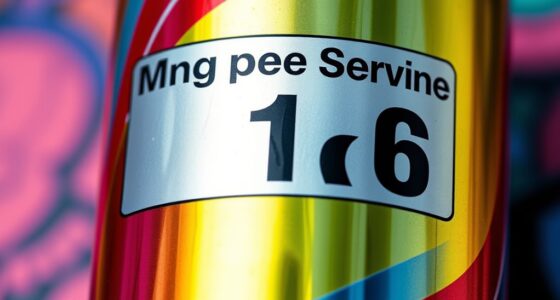Coffee can actually benefit your heart health, countering many myths that have circulated. Moderate consumption, about 2-3 cups a day, may lower your risk of cardiovascular diseases, heart attacks, and strokes. Regular drinkers often develop a tolerance to temporary blood pressure increases, while antioxidants in coffee, especially polyphenols, support cardiovascular protection. You might also find a link between coffee and lower depression rates, which further supports heart health. To maximize these benefits, moderation is key. Curious about how your coffee habits might fit into this picture? There's more to discover about this popular beverage and its effects!
Key Takeaways
- Moderate coffee consumption (2-3 cups/day) is linked to a lower risk of cardiovascular disease and heart failure.
- Antioxidants and polyphenols in coffee contribute to reduced inflammation and enhanced heart health.
- Regular coffee drinkers may experience a 20-30% lower risk of cardiovascular disease compared to non-drinkers.
- Studies suggest that coffee intake can reduce stroke risk by 25% for those consuming 1-2 cups daily.
- Health guidelines recommend limiting caffeine intake to 400 mg/day, adjusting for individual tolerance and health conditions.
Common Myths About Coffee

While many people believe that coffee is bad for your heart, research actually debunks several common myths surrounding its consumption.
One common myth suggests that coffee increases the risk of cardiovascular disease, but moderate coffee consumption—about 2-3 cups daily—might lower this risk.
You might think coffee raises blood pressure considerably, yet studies show any increase is usually temporary, and regular drinkers often develop a tolerance.
Another misconception is that coffee leads to heart failure, while evidence indicates moderate intake may actually protect your heart health.
Plus, the antioxidants in coffee, particularly polyphenols, contribute to cardiovascular protection.
Furthermore, coffee consumption has been linked to lower rates of depression, which may also support overall heart health.
Ultimately, moderate coffee consumption is linked to improved heart health outcomes, challenging the notion that all coffee is unhealthy.
Health Benefits of Coffee

When you enjoy your daily cup of coffee, you're not just indulging in a comforting ritual; you're also reaping several health benefits that can support your heart.
Here's what you might be gaining:
- Lower risk of coronary heart disease
- Protective effects against heart attacks and strokes
- Decreased mortality rates from cardiovascular diseases
- Reduced risk of developing high blood pressure
Moderate coffee consumption, about 3-5 cups a day, is linked to these benefits largely due to the antioxidants in coffee and the polyphenols that reduce inflammation.
Plus, caffeine consumption can increase adrenaline levels, enhancing physical performance.
Coffee's Impact on Heart Health

When it comes to heart health, moderate coffee consumption can actually reduce your risk of heart disease.
The antioxidants found in coffee, especially polyphenols, help protect your heart by fighting oxidative stress and inflammation.
However, remember that moderation is key, as too much coffee might increase your risk instead.
Heart Disease Risk Reduction
Understanding the potential benefits of coffee on heart health can be a game changer for many. Here are some key points to reflect upon:
- Moderate coffee consumption (2-3 cups daily) is linked to reduced heart disease risk.
- Regular drinkers show a 20-30% lower risk of cardiovascular disease.
- Studies indicate a 25% reduction in stroke risk for those consuming 1-2 cups daily.
- Antioxidants in coffee, particularly polyphenols, may play an essential role.
- Additionally, various brewing methods can influence caffeine content and its effects on heart health.
Antioxidants and Heart Protection
Although many may enjoy coffee for its rich flavor and energizing effects, its role as a source of antioxidants, particularly polyphenols, is equally significant for heart health.
Moderate coffee consumption, around 2-3 cups daily, has been linked to a reduced risk of coronary heart disease and heart failure. The antioxidants in coffee help combat oxidative stress and inflammation, promoting overall vascular health.
Research indicates that these polyphenols can improve endothelial function, which is vital for preventing cardiovascular disease. Additionally, regular coffee drinkers may experience a 20-25% lower risk of stroke. Furthermore, many sustainable coffee brands prioritize ethical sourcing practices, ensuring that the coffee you drink supports both your health and the health of the planet.
To maximize these benefits, it's best to enjoy your coffee without excessive sugar or unhealthy additives, ensuring you harness its protective effects on heart health.
Recommended Coffee Consumption

Moderate coffee consumption, typically defined as 3 to 5 cups per day, is linked to various health benefits without significant risks for most people.
Here's what you should know about recommended coffee consumption:
- Health Canada suggests a maximum caffeine intake of 400 mg per day for adults.
- Pregnant or breastfeeding individuals should limit caffeine to 300 mg per day.
- Individual tolerance to caffeine varies, so adjust your consumption based on personal health conditions.
- Filtered coffee may reduce cholesterol elevation risk compared to unfiltered methods.
Caffeine Guidelines and Considerations

When it comes to caffeine consumption, it's important to be mindful of the guidelines that can help you enjoy coffee safely.
Health Canada recommends that adults limit caffeine intake to 400 mg per day, which is about 3-4 cups of brewed coffee. For breastfeeding individuals, it's wise to reduce this to 300 mg daily to protect your infant.
If you're monitoring children under 18, keep their intake at 2.5 mg per kilogram of body weight.
Remember, moderation is key, as individual sensitivity to caffeine varies. Some might experience adverse effects like increased heart rate or anxiety even at lower doses.
If you need to limit caffeine, consider decaffeinated coffee to still savor the flavor without the jitters.
Ongoing Research and Evidence

As ongoing research sheds light on the connection between coffee and heart health, scientists are uncovering compelling evidence that suggests moderate consumption may offer protective benefits.
Recent studies reveal that:
- Moderate coffee drinkers (2-3 cups daily) have a lower risk of coronary heart disease.
- Antioxidants, particularly polyphenols in coffee, contribute to heart health.
- Evidence shows reduced risks of heart attack and stroke among coffee drinkers.
- Ongoing research is examining genetic factors affecting caffeine metabolism.
These findings challenge earlier beliefs about high blood pressure risks.
It seems that moderate coffee consumption can improve endothelial function and reduce arterial stiffness, ultimately leading to better cardiovascular health. Additionally, studies have shown that the adaptogens in coffee, such as caffeine and chlorogenic acid, can have a protective effect on the cardiovascular system. These compounds have been found to have anti-inflammatory and antioxidant properties, which can help prevent damage to the arteries and improve overall heart health. Overall, incorporating moderate coffee consumption into a balanced diet and healthy lifestyle may have positive effects on cardiovascular function.
Stay tuned as more studies unfold, providing deeper insights into coffee's role in heart health.
Frequently Asked Questions
What Do Cardiologists Say About Coffee?
Cardiologists generally agree that moderate coffee consumption can be beneficial for your heart health.
If you enjoy 2-3 cups a day, studies suggest you might lower your risk of coronary heart disease and stroke. The antioxidants in coffee help improve blood vessel function and reduce inflammation.
However, if you have high blood pressure, it's wise to monitor your intake, as too much caffeine can temporarily raise your blood pressure.
Moderation is key!
Is Quitting Caffeine Good for Your Heart?
Did you know that moderate coffee drinkers have a 10-20% lower risk of coronary heart disease?
Whether quitting caffeine's good for your heart depends on you. If you're sensitive to caffeine or have conditions like hypertension, reducing intake might help.
However, if you enjoy coffee in moderation, it could actually support your heart health.
It's all about balancing your personal health needs and understanding how your body reacts to caffeine.
Is There Any Evidence That Coffee Is Bad for You?
There's a lot of debate about whether coffee is bad for you, but current research suggests moderate consumption isn't harmful for most people.
In fact, studies show it can offer some health benefits. While high caffeine intake can temporarily raise your blood pressure, long-term drinkers often adapt to these effects.
Does Coffee Reduce Plaque Buildup in Arteries?
Research suggests that coffee might reduce plaque buildup in arteries. When you drink 3-5 cups daily, you may benefit from the antioxidants and polyphenols it contains.
These compounds can improve endothelial function and potentially lower your risk of coronary artery disease.
However, moderation's key; too much coffee can raise your heart rate and blood pressure, which could negate these benefits.
Conclusion
In the grand symphony of your heart health, coffee can play a harmonious role when enjoyed in moderation. By dispelling myths and embracing the science behind coffee, you can savor its benefits without fear. Just like a well-tuned instrument, finding the right balance in your coffee consumption can enhance your overall well-being. So, sip mindfully, stay informed, and let your love for coffee contribute positively to your heart's melody. Cheers to a flavorful journey ahead!










